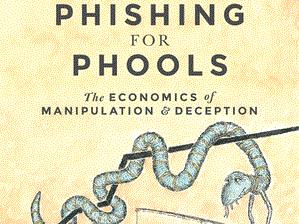Cover image: Phishing for Phools: The Economics of Manipulation and Deception by George A. Akerlof & Robert J. Shiller. Image via Princeton University Press.
The purpose of the Phishing for Phools: The Economics of Manipulation and Deception is not to convince the reader that free markets are bad economics but that they inevitably cause phishing.
George A Akerlof and Robert J Shiller have each received the Nobel Prize in Economics. As the joint authors of Phishing for Phools, which is about aspects of ‘free market’ economics that do harm, they bring a wealth of evidence to substantiate their theories.
The authors believe in a free market, defined as an economy based on supply and demand with some government control. But they do concede that a free market is an imperfect mechanism, given that many individuals are neither fully informed nor necessarily act in their own best interests.
The authors have extended the conventional definition of ‘phishing’, which typically refers to an attempt to get confidential information via the internet for fraudulent purposes, to getting people to do things that are in the interests of the ‘phisherman’ but not in the interests of the target. Their definition of a ‘phool’ is someone who, for whatever reason, has been phished.
The purpose of the book is not to convince the reader that free markets as defined are bad economics but that free markets inevitably cause phishing. At times, the authors illustrate their points with the use of analogies such as what checkout lane to choose in a busy supermarket or the repercussions when bad avocados are sold by a reputable wholesaler. This could be irritating to some readers but is no doubt intended to make the book accessible to those not familiar with economic theory, in which respect it succeeds.
For those who have suffered as a result of the 2008–09 financial crises, chapter two of this book gives one of the best overviews available of what happened and why it did. Many phools endured great hardship as a result of the phishing that helped create the crisis.
Chapters three to 11 proffer a host of examples of phishing, including in advertising, politics and health.
The chapter titled ‘The Resistance and its Heroes’ examines some ways to overcome phishing. Ethical behaviour by those with influence and appropriate laws and regulations provide partial answers to the problem. But sadly, the book does not make recommendations beyond these – perhaps because, in a free market, there is no single solution, although there are some cures for phishing outbreaks, not least a better-informed public.
To that end, Phising for Phools not only abounds in examples, it has five pages of acknowledgements and 76 pages of references and an excellent index. So it could be kept as a reference book and as one of the anti-phishing tools in your arsenal. Because if the authors are right that free markets, though flawed, are still the best economic models for developed countries, and if they are right that phishing is inevitable in a free market, then it follows some, if not all, of us will be phools from time to time. But you are less likely to be phooled if you have read this book, or at least the preface, introduction and conclusion.
Rating: 3 1/2 stars
Phishing for Phools: The Economics of Manipulation and Deception
By George A. Akerlof & Robert J. Shiller
George A. Akerlof, Co-Winner of the 2001 Nobel Prize in Economics
Robert J. Shiller, Co-Winner of the 2013 Nobel Prize in Economics
Paperback | 2016 | ISBN: 9780691173023
288 pp. | 5 x 8
Hardcover | 2015 | ISBN: 9780691168319
288 pp. | 6 x 9 1/4
Princeton University Press 2016





